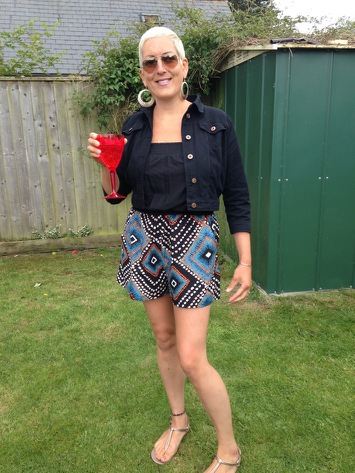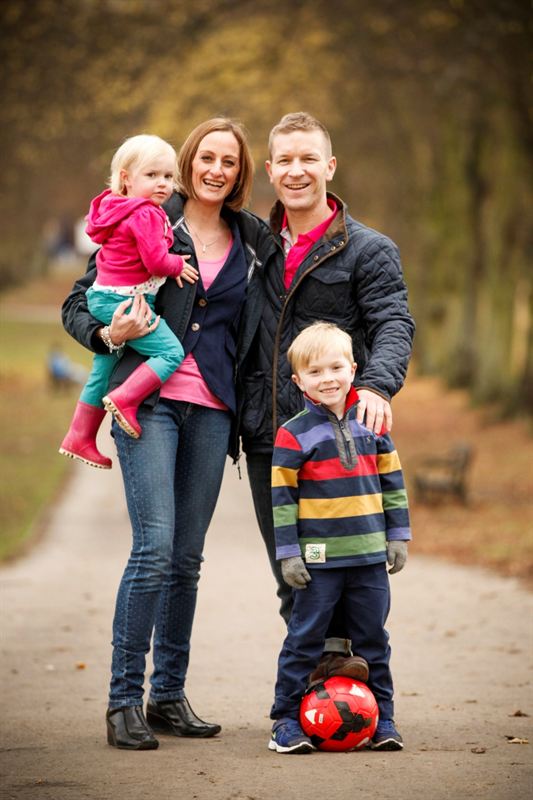Charity launches probe into brain tumour diagnosis waits
“Shocking” cases include woman who saw GP at least 40 times
“SHOCKING” delays to brain tumour diagnoses in the UK will be probed as part of a new drive to tackle the disease.
The study funded by The Brain Tumour Charity aims to discover how long it takes on average for adult brain tumour patients to be diagnosed after they first seek medical advice for their symptoms.
The two-year project is part of the charity’s campaign to raise awareness of brain tumours and improve treatment of the disease, which it highlights on Friday 6 March with its annual Bandanas for Brain Tumours Day.
Thousands of people around the UK will wear specially-designed bandanas on 6 March – part of Brain Tumour Awareness Month - to show their support for The Charity and its earlier diagnosis campaign.
Sarah Lindsell, The Brain Tumour Charity’s chief executive, said: “We hear so many shocking stories from patients whose brain tumours went undiagnosed for years after they first consulted a doctor about their symptoms.
“Many of them made numerous visits to their GP or saw several different doctors before they were finally referred for a scan. Far too often, they have ended up being diagnosed after a desperate trip to A&E.
“The research project we are funding should find out for the first time the real extent of the problem, why it happens and what can be done to make things better.”
A survey by The Brain Tumour Charity in 2013 found that more than a third of people with a brain tumour had visited their GP at least five times before they were diagnosed.
Among them was Dorset woman Amanda Moore.

Amanda, 32, first realised something was wrong after she had a seizure on a flight back from Turkey in 2009.
Doctors blamed the seizure on over-indulgence during her holiday but over the next two years her health problems worsened significantly.
“I felt dizzy and sick. I had a lot of headaches and what I thought was sinus pain. At one stage I was at the GPs probably about three times a week.
“I went at least 40 times in all.
“On the day before I was finally admitted to A&E and the tumour was diagnosed, I collapsed and was seen by paramedics. They asked if I ate a lot of cheese. I assume they thought there was a connection with the headaches.”
By the time Amanda’s tumour was diagnosed in June 2011, it was the size of large orange. It was treated with surgery and radiotherapy but a portion of it still remains, although scans so far have shown no regrowth.
She can no longer drive, because of the long-term damage caused to her brain by the tumour, and she remains on medication to control epileptic seizures.
“I do wonder, if they had diagnosed it sooner, whether it would have caused less damage. Perhaps things might not have changed so much in my life.”
St Albans financial advisor Sarah Belsom first sought medical advice in 2007 when she experienced flashing in her left eye.

Sarah, whose father died of a brain tumour in 2004, was told by doctors the problem was the result of laser eye surgery.
She lived with her symptoms until late 2012, when a severe episode was diagnosed as a migraine by her GP.
As the months passed, Sarah had regular bouts of flashing in her left eye as well as light-headedness, tiredness, clumsiness and a frequent feeling that she was not completely present in the room.
As a working mother with young children, she told herself that it was the result of tiredness.
It was not until she collapsed at her daughter’s nursery in 2013 that she was admitted to A&E. She was told it was probably nothing more than a fainting episode, but was referred back to her GP to arrange an MRI scan.
It took over four weeks for her to be offered a neurologist appointment for a date three months later. So Sarah went privately to see a neurologist.
A week later, on her birthday, Sarah was diagnosed with an aggressive brain tumour called a Grade 3 anaplastic astrocytoma. By that point it was the size of a tangerine.
Surgeons removed 90 per cent of the tumour and Sarah went on to have 33 rounds of radiotherapy.
She is now monitored regularly for any signs of recurrence.
Sarah said: “It is very frustrating to think that without my privileged access to private medical insurance, my brain tumour could have deteriorated rapidly whilst waiting for a diagnosis and treatment on the NHS.
“I could have put myself, my family and the public in danger as I was unwittingly still driving whilst having an undiagnosed hemianopia (loss of visual field) caused by the tumour.
“I appreciate that brain tumours are hard to detect, but the consequences of the combined delays on the NHS don't bear thinking about.”
The Brain Tumour Charity is assessing several bids by research teams to run the study of diagnosis waiting times. It will announce next month which team has been awarded the £300,000 grant to oversee the project.
The investigation follows the success of The Brain Tumour Charity’s HeadSmart campaign to raise awareness of children’s brain tumour symptoms.
Launched in 2011, HeadSmart has reduced the average time between the first presentation of symptoms and diagnosis of brain tumours in children from 9.1 weeks to 6.7 weeks.
Polly Newton, PR and Media Manager, The Brain Tumour Charity.
DD: 01252 418191 | M: 07990 828385 | polly.newton@thebraintumourcharity.org
About The Brain Tumour Charity
Registered Charity No. 1150054 (England and Wales) SC045081 (Scotland)
The Brain Tumour Charity is at the forefront of the fight to defeat brain tumours and is making a difference every day to the lives of people with a brain tumour and their families.
They fund pioneering research to increase survival and improve treatment options and raise awareness of the symptoms and effects of brain tumours to get earlier diagnosis and to help families cope with everything that the diagnosis of a brain tumour brings. They provide support for everyone affected so that they can live as full a life as possible, with the best quality of life.
They fund and promote the UK-wide HeadSmart campaign, raising awareness of the signs and symptoms of brain tumours in children and young people to make earlier diagnosis a reality. Earlier diagnosis will reduce long term disabilities and save lives. In just thee years, HeadSmart has reduced average diagnosis time from 9.1 weeks to 6.7 weeks.
Find out more at: www.thebraintumourcharity.org
Members of the Association of Medical Research Charities, The Information Standard, The Helplines Partnership and the Fundraising Standards Board.
Brain tumours – the facts
Brain tumours are the biggest cancer killer of children and adults under 40.
Over 9,300 people are diagnosed each year with a primary brain tumour, including 500 children and young people – that’s 25 people every day.
Almost 5,000 people lose their lives to a brain tumour each year.
Thousands more are diagnosed with secondary brain tumours, which are not recorded.
Brain tumours reduce life expectancy by on average 20 years – the highest of any cancer.
Just 14% of adults survive for five years after diagnosis.
Brain tumours are the largest cause of preventable or treatable blindness in children.
Childhood brain tumour survivors are 10 times more likely to suffer long term disability than well children.
This accounts for 20,000 additional disabled life years for all the children who are diagnosed each year.
Research offers the only real hope of dramatic improvements in the management and treatment of brain tumours.
Over £500m is spent on cancer research in the UK every year, yet less than 2% is spent on brain tumours.



